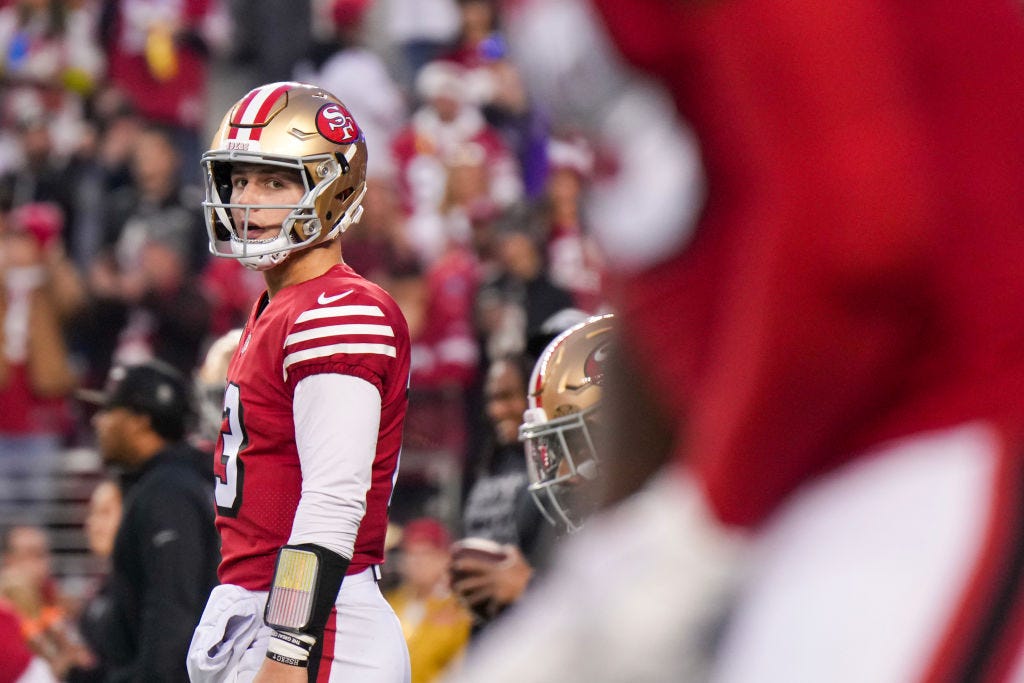Brock Purdy and the Stupidity of MVP Discussions
Brock Purdy lost his lead in the MVP race because of one game. Even though I don't think he should have ever led it, the process of losing it reveals how broken the MVP award system is.
Brock Purdy threw four interceptions – though only two “turnover-worthy plays” – in his Monday Night Football showing against the Baltimore Ravens (and Lamar Jackson) on Christmas Day. While Purdy struggled in other ways, the interceptions became a talking point and evidently tanked his MVP campaign.
His latest odds, according to Covers.com, put him somewhere near plus-750 this week, or a two-in-seventeen chance. Last week, he was at minus-250, or two-in-seven odds. Put another way, the implied probability that Purdy would walk away with the MVP award went from 71.4 percent to 11.8 percent.


The game was catastrophic and Purdy didn’t play well, but it seems absurd that one game could dramatically derail his odds. That bizarreness is magnified by the fact that the case for Purdy has been broadly statistical and centered around his remarkable scores in traditional statistics like passer rating and advanced statistics in EPA per play.
Purdy leagues the NFL in yards per attempt along with completion percentage …
Of the ten quarterbacks who have thrown at least 20 touchdowns, Purdy has the second-fewest interceptions. Purdy also leads the NFL in passer rating, throws that result in a first down, and is tied for the most passes of 40+ yards.
…
If you cycle through the recent MVP winners … the leader in EPA has been the winner each year. Purdy leads the NFL in EPA per play at .38. Dak Prescott, is in second … at .26. The gap is wide.
Purdy is also tops in the NFL in success rate at 57 percent, which is four percentage points ahead of Josh Allen. So not only is he generating big plays, but Purdy is keeping the 49ers offense on and ahead of schedule.
Most of this is still true following his disastrous game against the Ravens. He leads the league in passer rating and yards per attempt. The gap between his performance in adjusted net yards per attempt and Tua Tagovailoa, in second place, is a full yard. His lead in EPA per play is substantial, mind-boggling even.
If that’s the case for Purdy, it’s kind of ridiculous that one game – which didn’t change the aggregate truths – could modify the standings this dramatically. Jackson lost to the Steelers in a much more important divisional matchup with a passer rating of 65.2 and minus-0.250 EPA per play.
That’s nearly as bad as the less important but more visible cross-conference matchup Purdy lost later in the season.
Then again, the opposite is how Purdy entered the MVP conversation. In Week 13, against the Philadelphia Eagles in front of a national audience, Purdy threw for four touchdowns with 314 passing yards on 11.6 yards per attempt. But this was the game he had to do the least in — his supporting cast generated 71 percent of his passing yards after the catch.
In that game, Purdy never threw the ball past the 20-yard mark and only threw seven passes beyond the 10-yard mark. He averaged 29.0 yards per attempt on passes behind the line of scrimmage and 10.3 yards per attempt on passes between zero and nine yards beyond the LOS.
It was perhaps the worst possible game to make a case for a quarterback and it nevertheless put Purdy into the lead in the MVP race. That jump was dramatic — he ranked fifth the week before.
That’s not who Purdy is, but for skeptics, it cemented the idea that he is who he was.
OK, Then Why All the Purdy Skepticism?
I’m a Purdy skeptic, so it’s easy for me to explain where I come from. I don’t think he should be the MVP, but I also think it’s odd that people who believed he should have been leading also believe he should lose it after one game.
Almost every skeptical argument starts with Purdy’s supporting cast; it seems easy to dismiss his statistical accomplishments in light of two high-level receivers, a league-best tight end and the NFL’s best non-QB running game.
For Purdy proponents, the most compelling answer is a thought experiment. If you gave the best quarterback in the NFL the best supporting cast possible, what would it look like? Statistically, it would look a lot like Purdy’s play.


Still, there’s something substantial in the criticism.
Keep reading with a 7-day free trial
Subscribe to Wide Left to keep reading this post and get 7 days of free access to the full post archives.





